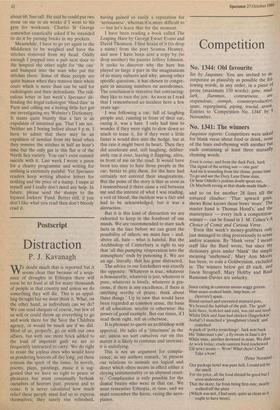Postscript
Distraction
P. J. Kavanagh
We doubt much that is reported but it seems clear that because of a sequ- ence of droughts in Ethiopia there will soon be no food at all for many thousands of people in that country and unless we do something they will die. This is an appal- ling thought but we must think it. What, on the other hand, as individuals can we do? We can send cheques of course, but few of us will or could throw up everything to go and work there for the Save the Children agency, or would be much use if we did. Most of us, properly, go on with our own affairs, but with one more brick added to the load of impotent guilt we are so frequently instructed to carry. We do right to resist the joyless ones who would have us pondering horrors all day long; yet these contain the spirit of the times. In novels, poems, plays, paintings, music it is sug- gested that we have no right to peace or pleasures but must continually bethink ourselves of horrors past, present and to come. It is never calculated how much relief these people must feel so to express themselves; they surely rise refreshed,
having gained so easily a reputation for `seriousness', whereas it is more difficult to — but let's leave that for the moment.
I have been reading a book called The Leaping Hare by George Ewart Evans and David Thomson. I first heard of it (to drop a name) from the poet Seamus Heaney, and now I have been sent a copy by (to drop another) the painter Jeffrey Johnson. It seeks to discover why the hare has played so large a part in the imaginations of so many cultures and why, among other specific questions, it has chosen to congre- gate in amazing numbers on aerodromes. The conclusion is tentative but convincing: they like to race the jets. As soon as I read that I remembered an incident here a few years ago.
I was following a car, full of laughing people and, running in front of their car, racing it, was a hare. I only had time to wonder if they were right to slow down so much to tease it, for if they went a little faster it would dive into the hedge, but at this rate it might burst its heart. Then they did accelerate and, still laughing, deliber- ately ran it over, leaving it flapping, alive, in front of me on the road. It would have been too easy to hate those people in the car; better to pity them, for the hare had certainly not entered their imaginations. But the point of the story is that as soon as I remembered it there came a veil between me and the interest of what I was reading, a veil of blood; the incident was a fact and had to be acknowledged, but it was a distraction.
But it is this kind of distraction we are exhorted to keep in the forefront of our minds. We are recommended to stare such facts in the face before we can grant the possibility of others: we must face – and, above all, hate – what is hateful. But the Archbishop of Canterbury is right to say that 'all this pumping vituperation into the atmosphere' ends by poisoning it. We are an age, literally, that has gone distracted.
The advice to our forefathers was exactly the opposite: 'Whatever is true, whatever is honourable, whatever is just, whatever is pure, whatever is lovely, whatever is gra- cious, if there is any excellence, if there is anything worthy of praise, think about these things.' Up to now that would have been regarded as common sense, the basis of all education, secular or otherwise: the power of good example. But our times, if I read them right, tell us otherwise.
It is pleasant to quote an archbishop with approval. He talks of a 'jitteriness' in the air; unless we sort ourselves out on this matter it is likely to continue and increase; it is stultifying.
This is not an argument for compla- cence; as my authors remark, 'at present our relations to animals are logical and direct which often means in effect either a cloying sentimentality or an abysmal cruel- ty.' Complacence is only possible for the dismal brutes who were in that car. We must remember Ethiopia, in time, and we must remember the hares; racing the aero- planes.


















































 Previous page
Previous page